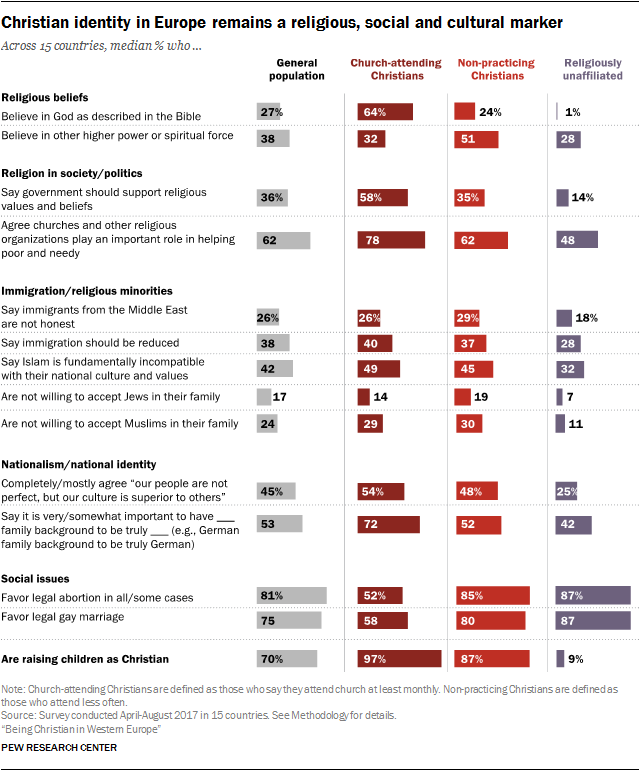Views on relationship between government and religion
Results of the Pew research Center survey:
Generally speaking, Western Europeans do not look favourably on entanglements between their governments and religion. Indeed, the predominant view in all 15 countries surveyed is that religion should be kept separate from government policies (median of 60%), as opposed to the position that government policies should support religious values and beliefs in their country (36%).
Generally speaking, Western Europeans do not look favourably on entanglements between their governments and religion. Indeed, the predominant view in all 15 countries surveyed is that religion should be kept separate from government policies (median of 60%), as opposed to the position that government policies should support religious values and beliefs in their country (36%).
Non-practicing Christians tend to say religion should be kept out of government policy. Still, substantial minorities (median of 35%) of non-practicing Christians think the government should support religious values and beliefs in their country – and they are much more likely than religiously unaffiliated adults to take this position. For example, in the United Kingdom, 40% of non-practicing Christians say the government should support religious values and beliefs, compared with 18% of “nones.”
In every country surveyed, church-attending Christians are much more
likely than non-practicing Christians to favour government support for
religious values. In Austria, for example, a majority (64%) of
churchgoing Christians take this position, compared with 38% of
non-practicing Christians.

The Pew survey also gauged views on religious institutions, asking whether respondents agree with three positive statements about churches and other religious organizations – that they “protect and strengthen morality in society,” “bring people together and strengthen community bonds,” and “play an important role in helping the poor and needy.”
Three similar questions asked whether they agree with negative assessments of religious institutions – that churches and other religious organizations “are too involved with politics,” “focus too much on rules,” and “are too concerned with money and power.”
Once again, there are marked differences
of opinion on these questions among Western Europeans across categories
of religious identity and practice. Throughout the region,
non-practicing Christians are more likely than religiously unaffiliated
adults to voice positive opinions of religious institutions. For
example, in Germany, a majority of non-practicing Christians (62%) agree
that churches and other religious organizations play an important role
in helping the poor and needy, compared with fewer than half (41%) of
“nones.”
Church-attending Christians hold
especially positive opinions about the role of religious organizations
in society. For example, nearly three-in-four churchgoing Christians in
Belgium (73%), Germany (73%) and Italy (74%) agree that churches and
other religious institutions play an important role in helping the poor
and needy. (For more analysis of results on these questions, see Chapter 6.)

